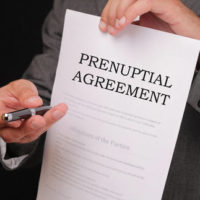
Equitable Distribution and Gifts
 Can a house be a “gift?” What is Marital Property? Under the family laws for NC Equitable Distribution and Gifts, a Charlotte home (Denver NC residence) was determined to be marital property in Bond v. Manfredo.
Can a house be a “gift?” What is Marital Property? Under the family laws for NC Equitable Distribution and Gifts, a Charlotte home (Denver NC residence) was determined to be marital property in Bond v. Manfredo.
Equitable Distribution involves the classification and distrubution of things like homes, bank accounts, personal property, 529 College Savings Plans, and retirement accounts. It is relatively complicated and often involves substantial sums of money – Bill Powers, Charlotte Divorce Attorney
Property distribution as part of a divorce is handled pursuant to North Carolina General Statutes and is not part of Common Law. Under N.C.G.S. Chapter 50, the family law statute, in handling the equitable distribution of what divorce lawyers may refer to as the “marital estate” or “marital property” (marital assets), the judge is required to follow a 3-step process:
- Determine what assets are marital property; and then,
- Figure out the net value of the property (Debts/encumbrances substracted from FMV Fair Market Value; and then,
- In an equitable fashion, distribute the property
Once a party makes an application for Equitable Distribution in Family Court, the Judge is required to determine what property is divisible property and marital property of the parties. North Carolina Family Laws – Distribution of Property
The family laws of North Carolina also require the Judge write a detailed and specific Order, such that the Court of Appeals (the reviewing court) can determine what was done, how Equitable Distribution was handled, and whether the decision was legally correct.
Equitable Distribution – Discretion of the Court
With few exceptions, Divorce in North Carolina is handled in District Court “Family Court.” Unlike other legal matters like a lawsuit in an accident case or contract dispute, the “amount in controversy” is not alleged in a Complaint for Divorce. For example, “small claims” in North Carolina are legal disputes under $10,000. District Court Civil Trials are limited to $25,000 in value and Superior Court Trials involve legal claims in excess of $25,000. See: Rules of Civil Procedure in North Carolina
As such, District Court Judges decide who gets the kids, visitation, support, and property distribution. That means juries in North Carolina do not decide family law issues involving equitable distribution. And those Family Court judges are given broad discretion in making their rulings. Put simply, but for an abuse of discretion, the Court’s Order will not be overturned.
Charlotte Divorce Lawyers may refer to that as the “abuse of discretion” standard, where the Court’s ruling will not be “disturbed” except in instances where the legal ruling and judgment of the court is “unsupported by reason” and “could not have been the result of competent inquiry.” Failure to follow the family laws in North Carolina (failed to comply with statute) can be an abuse of discretion.
Gifts to the Marital Estate – Gift of a Home
The NC Court of Appeals (NCCOA) ruled on August 21, 2018 in Bond v. Manfredo that use of the husband’s personal funds amounting to over $200,000 was a gift to the marriage. The husband and wife were married in 1999 and separated in 2014. In reviewing the legal ruling of the Hon. Sean P. Smith (a Charlotte NC District Court Judge), the NCCOA concurred with finding that the marital home was indeed a marital asset and therefore subject to Equitable Distribution.
The Husband in the case provided evidence, through personal testimony, that he never meant to make the home a gift to his wife and that her name was added to the Deed of Real Property because the closing attorney and real estate agent said her name had to be included.
Judge Smith found, in his Findings of Fact that, “the property was obtained and purchased for the joint benefit of the parties.” He additionally found the husband, “undoubtedly intended to make a gift to the marriage of the marital home.”
What is Marital Property in North Carolina?
Once again, what is and what is not marital property in North Carolina is defined by statute, which states in relevant part, “It is presumed that all real property creating a tenancy by the entirety acquired after the date of marriage and before the date of separation is marital property.”
Property is considered a gift, under the family laws, “only if such an intention is stated in the conveyance.” The conveyance, which is a transfer of legal ownership, may be inferred when one spouse uses what otherwise may normally be categorized as “separate funds” to purchase property titled to both parties in a marriage as husband and wife (tenancy by entirety).
Bill Powers – Charlotte Divorce Attorney
If you have questions about the financial effects of a separation and divorce, especially given the potential long term consequences of such substantial figures, it makes sense to retain legal representation. Bill Powers is here to help. CALL NOW: 704-342-4357
Learn More

What You Need to Know About Prenuptial Agreements
 What is a Prenuptial Agreement?
What is a Prenuptial Agreement?
A prenuptial agreement is a premarital agreement that is entered into before marriage and sets out the terms of separation. Prenuptial agreements are usually enforceable unless the agreement was entered into under duress, fraud or the agreement sets out unreasonable grounds thus rendering it void as a matter of public policy. Prenuptial agreements are usually signed after the couple enters into an engagement and before the marriage ceremony. Individuals who want prenuptial agreements are usually wealthy individuals, individuals who have been married before or people of advanced age. As mentioned, prenuptial agreements can include any terms over which the couple wants to contract over unless it is illegal. Couples frequently contract over asset and debt distribution, liabilities and child rearing. Some agreements include unusual, but legal terms, surrounding monetary penalties after infidelity as well as who retains custody of a pet during separation. Although couples can choose to contract over a wide range of topics, there are standard requirements contracting parties must follow that will result in an enforceable contract.
What Constitutes a Valid Prenuptial Agreement?
Parties must agree to a written contract that is signed before the marriage in order to constitute a valid prenuptial agreement. Firstly, both parties must freely enter into the contract without any pressure or duress. Secondly, all terms must be reasonable and fair. The terms contemplated in the agreement should apply to both parties where possible as to not bias one party over the other. Further, terms that are too speculative, overly personal (i.e., how a spouse should keep his or her appearance), or far-reaching (i.e., agreements seeking to control the actions of non-parties). Each party must fully disclose all assets, debts and liabilities. This rule usually targets the higher earning spouse who does not want a lower earning spouse to have a clear picture of the sources of their wealth. This rule also applies to spouses who are in heavy debt and seek to hide the debt. Importantly, each party to the prenuptial agreement should hire his or her own attorney to seek legal advice. It is a conflict of interest and unethical for one attorney to represent the interests of both parties who are in effect, adverse parties, for the purposes of the agreement. Even if one party chooses not to hire an attorney, that party should know that they are entitled to an attorney if they so choose.
Common Prenuptial Agreement Disputes
Common disputes that arise out of prenuptial agreements come to bear during marital separation when one spouse seeks to invalidate the agreement. The arguments advanced for the invalidation of a prenuptial agreement can come from credible and non-credible parties. Therefore, each party seeking to invalidate an agreement is subject to a credibility review as long as the agreement bears their signature. Parties who wish to invalidate the agreement can do so if the party believes they did not freely enter into the agreement thus were subject to pressure or duress. Another ground for invalidation is where one party is not aware of their right to seek the advice of legal counsel before signing. In this case, the court will review the totality of the circumstances as well as the education and sophistication of the party to render a decision.
Charlotte Divorce Attorneys
The attorneys at Powers Landreth PLLC have represented and advised clients on prenuptial agreements for many years. We will fight for your right to have an agreement invalidated or enforced based your unique needs. We have substantial knowledge in prenuptial contract law and we will aggressively represent your interests. Contact us now for a consultation.
Learn More